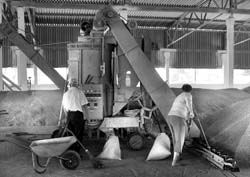Nothing but crooks, debts, and draft resolutions

The State Reserves Commission (Derzhkomrezerv) is short 340,000 tons of grain. Its chairman, Viktor Kyrychenko, believes this grain was stolen. An additional 40,000 tons were sold at the low price of 129 hryvnias per ton. “Afterward they tried to resell this grain to us but at 840 hryvnias a ton,” Kyrychenko told journalists. “Of course, we are taking the most active measures to return it, but we are managing to restore only an insignificant part. We are still working on this.” Kyrychenko also noted that Prime Minister Yanukovych has sent a special directive to relevant power structures and oblast state administrations.
Stealing is, as they say, an old story, although the theft should not affect this year’s government grain purchases. The required amount will be harvested on time, Kyrychenko assured. By the end of this year the state reserve will contain one million tons of grain, precisely as ordered by the government. Purchase contracts for some 250,000 tons have been made, and there is enough money to fulfill the grain purchase plans. The chairman of the Derzhkomrezerv did not specify the amount of grain currently in the state bins, explaining that this information is not “meant for the masses.”
The committee’s policy is geared to a gradual increase of the purchase price. “We are revising the price-setting policy so as to increase prices and bring them closer to market ones.” Today third-grade wheat is purchased at 840 hryvnias and fourth-grade at 780. Prices were lower in the past, but in view of the domestic market situation Derzhkomrezerv was forced to raise them. Grain is acquired on a competitive basis and recently, through the Agrarian Exchange.
Unlike grain, there appear to be no problems with sugar. A small amount — between 10,000 and 15,000 tons — still needs to be purchased, and then the state reserve will be complete, says Kyrychenko. However, he admits that this is “the maximum amount we will be purchasing.”
Has anything been bought yet? There was no concrete answer to this question. Instead, the chairman of Derzhkomrezerv gave assurances that the problem will be mostly solved before long. He went on to explain that the committee is cooperating with the government, because it is an important component of state policy, the economy, and the social sphere. No one can argue with this. If only the Derzhkomrezerv chairman were more specific and less on the pompous side in trying to convince everyone of his importance.
In reality, the current state reserve, including the mobilization reserve, is a big pile of problems. Under the Soviets it stored literally everything, including probably not just sausages but missiles. Today there is practically no room for storing huge reserves, and manufacturers who used to do the storing obediently are now private businesses and demanding payment for their services. Kyrychenko complained that “if we don’t pay private enterprises for storage, a precondition for the arbitrary use of the mobilization reserve arises.”
As a result, Derzhkomrezerv keeps piling up receivables and payables, and the cabinet is being forced to deal with this problem. Among the biggest debtors to the state are energy companies, but the government is hardly likely to make them pay during the winter period when so much depends on them. According to Kyrychenko, the total amount of debts to the committee for previous commodity credits to various enterprises, ministries, and agencies is about 3.5 billion hryvnias, compared to the committee’s outstanding storage bills of 58 million hryvnias. Still, court officers have blocked Derzhkomrezerv’s bank accounts meant for commodity and material goods storage payments. Kyrychenko is worried about bases, enterprises that specialize exclusively in storage and whose survival depends on timely storage payments from the committee.
The Accounting Chamber recently did a thorough audit of Derzhkomrezerv. Kyrychenko says that among other things they were accused of lack of transparency of their tenders. The committee chairman appears to agree with these accusations. He hopes the cabinet will adopt a resolution on new procedures governing the sales of material goods from the state reserve, which will allow a more transparent pattern to be adopted next year. In the past, access to Derzhkomrezerv tenders was granted only to certain structures, Kyrychenko admits: “Regrettably, only a certain number of enterprises were allowed to take part in tenders selling commodities and other material goods. These structures had profits from this, sometimes superprofits.”
In view of this situation, the committee submitted a proposal to the cabinet requesting that commodity and material goods tenders for such structures as the interior and defense ministries and others be held only with these ministries and participating agencies. This way Kyrychenko’s committee expects to lower the level of corruption.
Kyrychenko believes that Derzhkomrezerv must become a powerful lever of influence on the domestic commodity and material goods market. To this end he is collaborating with the Ministry of Economy to develop a concept aimed at upgrading the committee, subject to cabinet approval. For the time being, the committee is taking the first steps to combat the age-old problems of corruption, theft, and debts.






